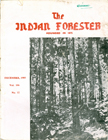Aerial Spraying of Chemicals to Control Tea Mosquito (Helopeltis antonii Signoret) in Cashew Plantations in Goa
DOI:
https://doi.org/10.36808/if/1980/v106i12/11278Abstract
The paper describes in detail aerial spraying of cashew plantations in Goa with pesticides to control tea-mosquito, Helopeltis antonii which is a very serious pest of cashew plantations in India, especially on the west coast. It is estimated to reduce the yield of nuts and apples from the plantations to the tune of 30-40%. Aerial spraying was done over an area of 2540 ha of yielding cashew plantations during the pre-and post-flowering period during 1976-77. Dealing with large-sized and well-stocked plantations serial spraying was found more effective and economical or motor-driven sprayers. Due to hilly terrain, helicopter was used with advantage for serial spraying. The pesticides used were thiodon-(endosulfan), and Dimecron-(a phosphamidon). Thiadon is a contact poison; dimecron is both a contact and systemic poison. Both were found equally useful and useful and effective in controling tea-mosquito.Downloads
Download data is not yet available.
Downloads
Published
1980-12-01
How to Cite
Bhattee, S. S. (1980). Aerial Spraying of Chemicals to Control Tea Mosquito (<I>Helopeltis antonii</I> Signoret) in Cashew Plantations in Goa. Indian Forester, 106(12), 837–841. https://doi.org/10.36808/if/1980/v106i12/11278
Issue
Section
Articles
License
Unless otherwise stated, copyright or similar rights in all materials presented on the site, including graphical images, are owned by Indian Forester.





